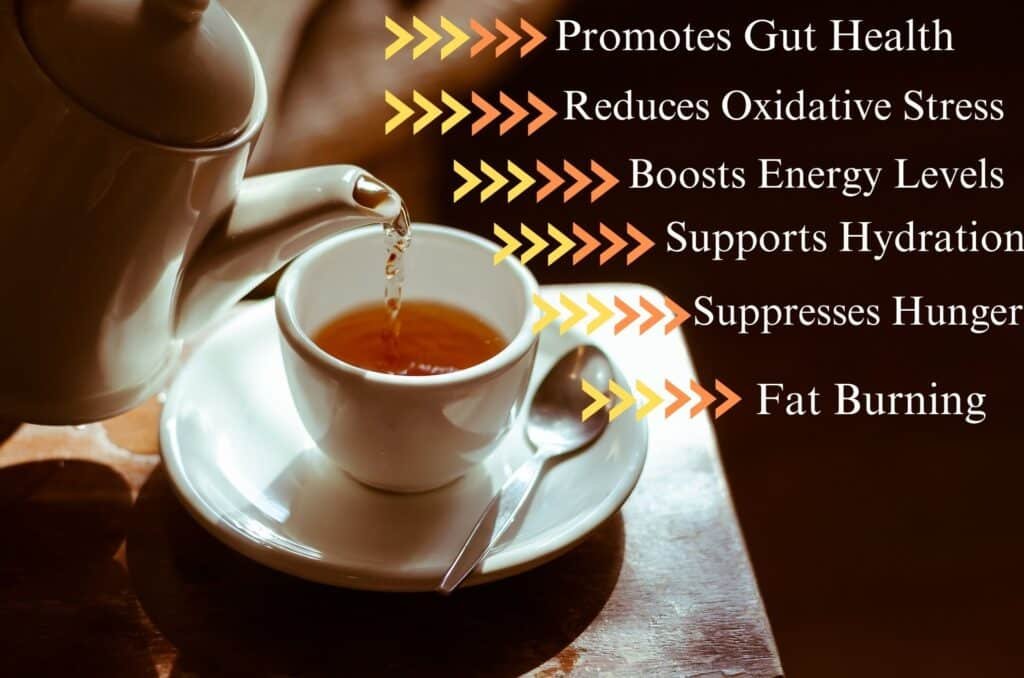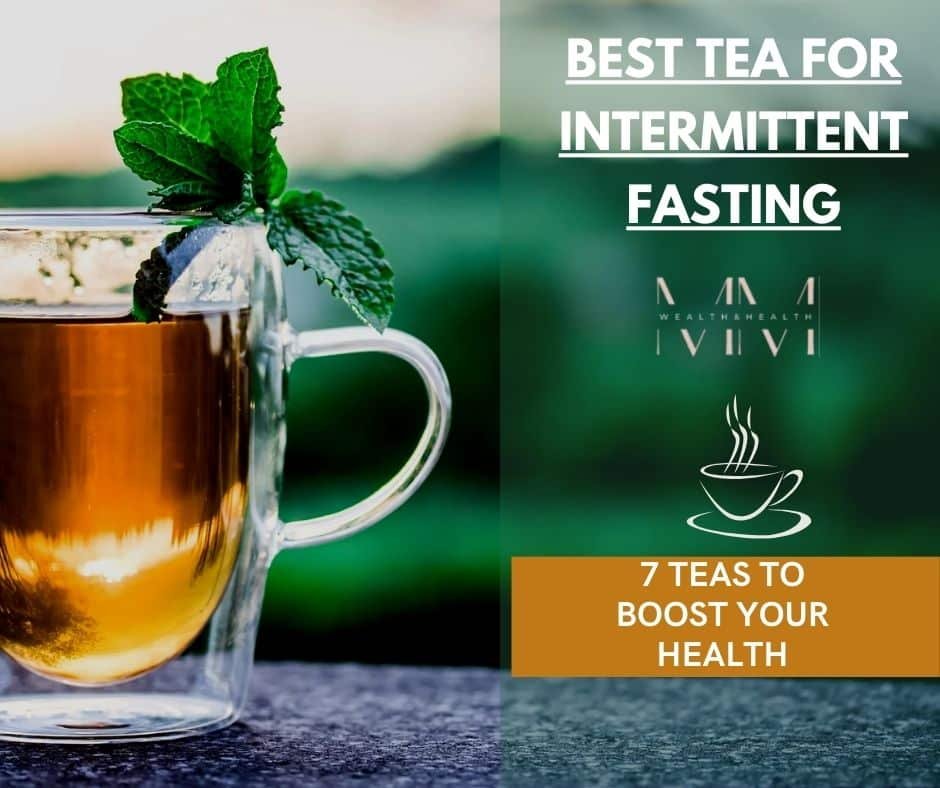Intermittent fasting (IF) is an innovative wellness trend that intertwines health optimization, effective weight management, and the potential for longer life. However, effectively managing fasting windows can often be a tiring practice, especially when hunger pangs emerge, or energy levels take a nosedive. This is where the best tea for intermittent fasting has become an exceptional ally in your journey. With its zero-calorie composition, calming rituals, and myriad health benefits, tea seamlessly bridges the gap between fasting periods.

In this comprehensive guide, embark on a journey to uncover the finest teas for fasting, explore their remarkable benefits, and learn how they can significantly enhance your fasting experience, all while bolstering your overall health objectives.
What Is Intermittent Fasting?
Intermittent fasting is all about creating a balance between periods of eating and fasting, allowing your body the time it needs to repair, recharge, and burn fat more efficiently. One of the most popular methods is the 16:8 approach, where you fast for 16 hours and eat within an 8-hour window, simple yet effective. Another widely used method is the 5:2 approach, where you eat normally for five days and restrict your calories on the other two days. Both approaches have helped countless people feel more energized, focused, and healthier.
Benefits of Intermittent fasting
Intermittent fasting offers so much more than just weight loss. When you fast, your body goes into repair mode, improving insulin sensitivity and boosting your metabolism. It’s like hitting a reset button for your body. Studies have proved that intermittent fasting may lower the risk of chronic conditions such as heart disease and diabetes, while also improving brain function and promoting longevity. It’s not just about shrinking your waistline; it’s about boosting your overall health and vitality.
However, staying hydrated and keeping hunger at bay during fasting periods can be a challenge, which is where the magic of fasting-friendly beverages like tea comes in. Tea helps you stay refreshed, curbs those hunger pangs, and even boosts fat burning, all while keeping you in your fasting zone. Scientific studies show that drinking tea during intermittent fasting can help with weight loss, hunger, and sleep So, as you dive deeper into the world of intermittent fasting, consider making tea your trusty companion on this wellness journey.
Why Tea During Fasting is Beneficial?
Tea emerges as an ideal companion during the fasting process, enhancing the experience without disrupting the fasting state. Unlike sugar-laden drinks or plain black coffee, tea comes with many benefits that promote health and wellness. It aids in managing blood sugar levels, enhances insulin sensitivity, and supports weight management efforts. Also, the diverse range of tea varieties ensures that you can find a flavor or type that you genuinely enjoy, making it a delightful and effective choice for anyone following an intermittent fasting routine.
Best Tea for Intermittent Fasting
| Type of Tea | Key Benefits | Ideal For |
|---|---|---|
| Green Tea | High in antioxidants (e.g., epigallocatechin gallate), supports fat burning, boosts metabolism, and aids insulin sensitivity. | Fat loss, energy boost, metabolic health. |
| Black Tea | Bold flavor, rich in caffeine, improves heart health, reduces oxidative stress, and supports weight loss goals. | Morning energy, replacing black coffee. |
| Herbal Teas | Includes peppermint tea, ginger, and hibiscus teas; aids digestion, reduces hunger pangs, and calms stress. | Relaxation, gut health, fasting comfort. |
| Oolong Tea | Enhances fat burning, reduces body fat, and helps manage cholesterol levels. | Long-term weight management. |
| White Tea | Gentle on the stomach, promotes detox, and contains immune-boosting antioxidants. | Sensitive stomachs, overall detoxification. |
| Hibiscus Tea | Lowers blood pressure, supports heart health, and aids hydration. | Cardiovascular health, hydration. |
Benefits of Drinking Tea During Intermittent Fasting
Drinking tea with health benefits during the fasting period can make a significant difference in how your body responds to intermittent fasting. With antioxidant-rich varieties like white tea and green tea, you can enhance fat oxidation and even support long-term weight loss goals. Combining the benefits of healthy tea with the benefits of intermittent fasting will enhance a better medical condition as well.
1. Fat Burning
While weight loss tea may sound like a simple beverage, the health benefits of tea go beyond fat-burning. Certain teas, notably green tea, and oolong tea have earned a reputation for their remarkable ability to boost metabolism. The key component, catechins—especially epigallocatechin gallate (EGCG)—enhance body fat oxidation. These teas are particularly beneficial for individuals pursuing weight loss, as they can accelerate the burning of stored fat.
2. Suppresses Hunger
Herbal teas like peppermint and ginger are not just flavorful; they possess natural properties that help to curtail hunger pangs. By soothing cravings and providing a sense of fullness, these teas offer a comforting solution during fasting hours, all without adding any extra calories to your daily intake.
3. Supports Hydration
Maintaining proper hydration is vital for overall well-being, especially during fasting periods. Unsweetened tea serves as an excellent, calorie-free alternative to sugary drinks or those laden with artificial sweeteners, which can interfere with insulin levels. By enjoying a warm cup of tea, you can stay refreshed and hydrated without any adverse effects on your fasting state.

4. Boosts Energy Levels
Unlike sugary beverages that can lead to intense crashes, teas such as black tea and green tea provide a gentle boost of energy. With their moderate caffeine content, these teas can help you maintain focus and stamina throughout the day, offering a steady stream of energy without the jitteriness that often accompanies stronger caffeinated drinks like heavy black coffee.
5. Promotes Gut Health
Herbal teas, including chamomile and ginger tea, are known for their soothing properties which can be incredibly beneficial for digestive health. They help to alleviate bloating and discomfort, promoting a healthier gut environment. Incorporating these calming blends into your routine can encourage better digestion during fasting.
6. Reduces Oxidative Stress
Many teas, particularly white and green varieties, are rich in antioxidants that help combat oxidative stress in the body. By neutralizing harmful free radicals, these antioxidants support to fight against cardiovascular disease and can significantly reduce the risk of chronic diseases, including high cholesterol. Drinking antioxidant-rich teas can be a delicious way to fortify your body against oxidative damage while fasting.
Tea Forms – How to Brew Your Ideal Companion
How you brew your tea can transform a simple sip into a ritual that enhances your fasting routine. From the convenience of tea bags to the rich, customizable flavors of loose leaves, each method offers its own unique charm. Whether you’re on the go or savoring a quiet moment, the right tea form can elevate your fasting experience and make every cup a moment of joy. Let’s dive into the different tea forms, so you can choose the one that best fits during you intermittent fasting period.
| Form | Description | Pros | Cons |
|---|---|---|---|
| Tea Bags | Pre-filled sachets for easy brewing in hot water. | Convenient, quick brewing. | Limited flavor intensity. |
| Loose Leaves | Fresh leaves are steeped in hot water using an infuser or strainer. | Rich flavor, customizable strength. | Requires extra tools. |
| Capsules | Tea extracts in pill form. | Easy to carry, no brewing required. | Limited regulation, possible risks. |
| Tea Strips | Dissolvable strips for waste-free, on-the-go tea preparation. | Portable, eco-friendly. | Limited availability, high cost. |
Comparing Tea to Other Fasting Drinks
When you’re intermittent fasting, the drinks you choose can make a big difference in how successful your fast is. Staying hydrated is key, but picking the right beverages can also help boost your metabolism, keep your energy up, and curb hunger. While plain water is always a safe choice, drinks like black coffee, unsweetened tea, and even cinnamon water can offer an extra boost without breaking your fast.
Cinnamon water, in particular, can help regulate blood sugar and improve insulin sensitivity, making it a great option during fasting. However, not every drink is ideal for fasting. For example, bone broth is nutrient-rich but contains calories, which could break your fast. To make it easier for you, here’s a quick comparison of some of the most popular drinks during fasting, along with their benefits and whether they’re fasting-friendly.
| Drink | Calories | Fasting-Friendly | Key Benefits |
|---|---|---|---|
| Plain Water | Zero Calories | Yes | Hydration. |
| Black Coffee | Zero Calories | Yes | Energy boost, appetite suppressant. |
| Bone Broth | Varies | No (contains calories) | Nutrient-dense, but not fasting-safe. |
| Unsweetened Tea | Zero Calories | Yes | Hydration, metabolism boost, detox. |
Intermittent Fasting for women – By Patricia Nestor
Struggling with stubborn weight, sluggish metabolism, or hormone imbalances? Patricia Nestor’s book, How to Lose Weight, Boost Metabolism, and Balance Hormones, is your ultimate guide to using intermittent fasting to reclaim your health. With a focus on women’s unique needs, Nestor offers practical tips, evidence-based insights, and easy-to-follow strategies to incorporate fasting into your daily life. This isn’t just a guide, it’s your toolkit to feel energized, empowered, and confident in your body.
Helpful Tips for Choosing the Best Fasting Tea
The Perfect tea can hydrate, curb your hunger, and even boost your metabolism, but there are a few important things to consider. From avoiding artificial sweeteners to being mindful of your caffeine intake, small adjustments can make a big difference in how effective and enjoyable your fasting routine is. Here are some helpful tips to ensure you’re sipping your way to success during your intermittent fasting journey.
1. Avoid Artificial Sweeteners: When enjoying your tea, it’s best to stick to plain varieties without any additives. Artificial sweeteners can alter the natural flavor profile of the tea and might have unintended health effects. Instead, consider using natural sweeteners like honey or agave in moderation if you desire a bit of sweetness.
2. Consider Caffeine Intake: It’s important to be mindful of your daily caffeine consumption. Different types of tea contain varying levels of caffeine, which can affect your energy levels and sleep patterns. By planning your tea consumption throughout the day, you can enjoy its benefits while preventing over-caffeination, which can lead to jitters or insomnia, particularly if consumed too late in the day.

3. Experiment with Flavors: The world of tea is vast and offers a myriad of flavors and blends. Take the time to explore different types of tea, such as green, black, oolong, and herbal varieties. This not only enhances your enjoyment but also helps to keep your tea-drinking experience fresh and exciting over the long term. Consider trying different brewing methods or adding spices and fruits for a personalized twist.
As per the article from the National Library of Medicine have done research and highlighted that specific teas like green tea can work synergistically with fasting, helping to accelerate fat burning and improve fasting and metabolism. A great way to stay hydrated during intermittent fasting while also benefiting from the potential metabolic boosts that certain teas, like oolong and green tea, offer.
4. Consult Your Healthcare Provider: Before introducing new herbal infusions or potent teas into your routine, particularly if they have health claims or may interact with medical conditions or medications, it’s wise to consult with your healthcare provider. Some herbal teas can have strong effects on the body, which might not be suitable for everyone, especially those with specific health concerns or those who are taking certain medications.
1. What’s the best tea to drink while intermittent fasting?
If you’re fasting, the best teas keep you hydrated and support your metabolism without disrupting your fast. Green tea tops the list, thanks to its powerful antioxidants like EGCG, which help burn fat and improve insulin sensitivity. Black tea is another solid choice, providing a nice energy boost. Herbal teas like peppermint and ginger are also great for soothing hunger and helping with digestion, all while keeping things calorie-free.
2. Can I add milk or sugar to my tea during intermittent fasting?
While it’s tempting to sweeten your tea, adding milk or sugar during intermittent fasting is best avoided. Both milk and sugar contain calories, which can break your fast. Stick to unsweetened tea for the best results. If you’re craving a little sweetness, try natural, zero-calorie sweeteners like stevia, or just a small drizzle of honey—but remember, moderation is key!
3. Will drinking tea break my fast?
Don’t worry, drinking plain, unsweetened tea won’t break your fast. Tea, whether it’s green, black, or herbal, is naturally calorie-free and doesn’t interfere with the fasting process. In fact, it can be an awesome ally during fasting by helping curb hunger, boost metabolism, and keep you hydrated without adding calories to your intake.
4. How much tea can I drink during intermittent fasting?
A: You can enjoy as much unsweetened tea as you like while fasting! Tea is an excellent hydration option and won’t affect your fast. Just keep an eye on your caffeine intake—too much caffeine might make you jittery or disrupt your sleep. Moderate consumption of your favorite tea throughout the day will keep you refreshed and energized while you fast.
5. What are the benefits of drinking tea while intermittent fasting?
Tea offers a ton of benefits during intermittent fasting! Green tea is a metabolism booster, while herbal teas like peppermint or ginger help keep hunger at bay and support digestion. Black tea provides a mild energy boost, and all types of tea help keep you hydrated, which is crucial when you’re not eating. Plus, many teas are packed with antioxidants that help reduce stress and promote overall health during your fasting periods.
6. Can I drink herbal tea during intermittent fasting?
Absolutely! Herbal teas are a great choice while fasting. Teas like chamomile, peppermint, and hibiscus are naturally calorie-free and can help reduce cravings, aid digestion, and keep you feeling relaxed. Plus, they come in so many flavors you’ll never get bored. Just be sure to skip herbal teas that contain added sugars or sweeteners if you aim to keep your fast intact.
Conclusion – Intermittent Fasting and Tea
Drinking tea during intermittent fasting is more than a habit, it’s a lifestyle choice. With its zero-calorie profile, potential health benefits, and calming properties, tea becomes the ideal companion for your fasting journey. Whether you sip on hibiscus tea to lower blood pressure or rely on green tea to boost metabolism, there’s a world of teas to explore. Remember to match your tea choices to your fasting goals, personal preferences, and health conditions for the best experience.

Start your day with a cup of unsweetened tea and end it with a soothing herbal infusion. Your fasting routine has never been more enjoyable or more effective.
Find your perfect tea today and take the first step toward a healthier, more energized you!



